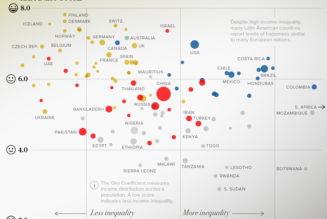
Islam is on the rise in the United States. According to a 2017 Pew Study, the Muslim American population is “growing rapidly” through a combination of immigration, conversion, and a high fertility rate. The growth of Islam in America means that Christians are interacting with Muslims more than ever before. How are Christians responding? The media often suggests that American Christians (especially Evangelicals) have turned Islamophobic, but at the talks I give around the country I encounter more curiosity about Islam than hatred or fear. Most questions I address are not about jihad or sharia, but about Allah. Christians regularly ask whether the God of Islam is the God of Christianity. Should Muslims, like Jews, be counted as fellow believers? Or is Allah a different God, the creation of Muhammad and fundamentally unlike the God of the Bible?
In his 1984 book Muhammad and the Christian the Anglican bishop Kenneth Cragg writes, “The answer to the vexed question, ‘Is the God of Islam and the God of the Gospel the same?’ can only rightly be ‘Yes!’ and ‘No!’.” The concern that led Cragg to this answer, or rather this failure to answer, is one shared by many orthodox Christians interested in friendship with Muslims. Muslims disagree with Christians on a number of things, including the Trinity, the nature of Christ, and the authority of the Bible. Yet many Christians are eager to emphasize what we hold in common with Muslims. Many hold up the piety of Muslims, particularly in their fidelity to prayer, as an example to be emulated.
The urge to recognize commonality with Muslims is felt more strongly by many Christians these days in the West, as the number of “nones” continues to grow and religion is pushed out of the public sphere. During a recent seminar on Islamic Origins at Notre Dame a Christian student raised some concern with “ideas that will inevitably antagonize Muslims,” adding, “Muslims are our allies against secularism.”
Yet other Christians feel the challenge from Muslims more acutely than they do the challenge of the nones. The God of Islam cannot be the true God, they hold, and the spread of Islam is necessarily a threat to the Church. Nabeel Qureshi, a Muslim-background Christian believer and author of Seeking Allah Finding Jesus, argues that the problem begins with the Qur’an’s position on Jesus:
Let’s start with the obvious: Christians believe Jesus is God, but the Quran is so opposed to this belief that it condemns Jesus worshipers to Hell ([Qur’an] 5.72). For Christians, Jesus is certainly God, and for Muslims Jesus is certainly not God. How can it be said that Christians and Muslims worship the same God?
Qureshi (who died at the age of 34) was responding to a controversy that started with a Facebook post by Larycia Hawkins, the first female African-American tenured professor at evangelical Wheaton College. On December 10, 2015, Hawkins posted a picture of herself wearing an Islamic headscarf and wrote: “I stand in religious solidarity with Muslims because they, like me, a Christian, are people of the book. And as Pope Francis stated last week, we worship the same God.”
Now, Muslims generally do not consider themselves “People of the Book,” but instead reserve this title for Jews and Christians. And Christians usually do not adopt this title. For Christians, in fact, the center of the religion is Christ, not any book. It is also not clear what statement of Pope Francis Hawkins was referring to, although she was right about his belief that Christians and Muslims worship the same God.
In a March 20, 2013 address to representatives of churches and world religions (after addressing some comments to Jewish representatives), he declared, “I greet and thank cordially all of you, dear friends belonging to other religious traditions; firstly the Muslims, who worship the one living and merciful God, and call upon Him in prayer.”
Hawkins’s post led to trouble with Wheaton. In part because of angry response by benefactors and alumni, she was put on leave for her statement, which the College held violated the statement of faith that she, like every other faculty member at Wheaton, had signed. Eventually Hawkins left Wheaton and was hired by the University of Virginia (her story is now featured in a documentary film entitled Same God).
Miroslav Volf, a prominent evangelical professor at Yale Divinity school (and author of a book entitled Allah: A Christian Response) entered the fray with a Washington Post editorial entitled: “Wheaton professor’s suspension Is about anti-Muslim bigotry, not theology.” Volf argues that only bigotry against Muslims could have motivated Wheaton’s move. After all, Jews hold a teaching on God that is not far from that of Muslims. Jews, too, deny the Trinity and the Incarnation, and yet Christians have no problem affirming that the Jewish God is their God. It was Volf’s editorial that provoked Nabeel Qureshi to intervene on the other side of the question.
Volf’s argument faltered on the fact that Jews, Christians, and Muslims alike know God not only through reflection on the created order and the human person, but also through his self-disclosure as transmitted in scripture. There’s the rub: Christians and Jews share a Scripture. Christians and Muslims do not. Muslims do not recognize the Old or the New Testament. They judge the Bible muharraf, or “falsified.” This does not mean that they do not know God, but it does mean that getting to a “yes” answer on the same God question is not as easy as pointing to the case of the Jews. One cannot simply say, “Jews also reject the Trinity, but Christians have no problem there!”
The Catholic Church since Vatican II has taught in different ways that Muslims and Christians do worship the same God. Lumen Gentium §16 includes the line: “Muslims, who, professing to hold the faith of Abraham, along with us adore the one and merciful God, who on the last day will judge mankind [nobiscum Deum adorant unicum, misericordem].” Pope Saint John Paul II, speaking in front of a soccer stadium filled with young Muslims in Casablanca, Morocco, in 1985, famously declared:
We believe in the same God, the one God, the living God, the God who created the world and brings his creatures to their perfection.
More recently Pope Francis implied as much when he signed the Declaration on Human Fraternity in early 2019, together with the grand imam of Al-Azhar, in Abu Dhabi. Therein the two religious leaders mutually declare: “We, who believe in God and in the final meeting with Him and His judgment.”
Yet while the Church has affirmed that Muslims and Christians worship the same God it has never explained clearly its reasoning. Just as it is not enough to point to the case of the Jews, it is not enough simply to affirm that both Muslims and Christians worship one God. A question lies before us: does the Islamic understanding of that one God correspond closely enough to how God has revealed himself to Israel and the Church?
A thought experiment might prove this point: Suppose I were to start a new religion today, teaching a 21st version of Marcionism, that the one God is evil and created the world because he enjoys watching humans suffer? Or, perhaps, that the one God is a physical being who lives in the next solar system? Most Christians (and Muslims) would deny that my god is their God, even though we both believe in one God.
Yet believers do not have to agree on everything about God to affirm that we share belief in him. My wife’s understanding of God is no doubt different from mine in certain ways although we are both Catholics. Nevertheless, we hold so much in common in regard to God that neither of us doubt that we worship the same God. The relationship of Christian and Islamic conceptions of God presumably lies somewhere in between these two cases. But which does it resemble more? Is there enough in common between Islamic and Christian conceptions of God to affirm that we worship him together?
The first step is to examine the presentation of God in the Qur’an, and the first thing a curious reader will find is how the Islamic scripture repeatedly emphasizes the mercy of God. Every chapter, or Sura, of the Qur’an (except for one, Sura 9), begins with the invocation (known as the basmala in Islamic tradition): “In the name of God, the compassionate, the merciful.” In four passages (all involving Biblical characters: Q 7:151; 12:64; 12:92; 21:83), God is described in the Qur’an as “most merciful of the merciful.” And on 56 occasions the Qur’an simply names God “The Merciful One” (in Arabic, al-Rahman, a name that was used already in Ancient South Arabian to refer to God).
A number of scholars have argued that mercy is the primary or fundamental attribute of the Qur’anic God. In a recent article the Pakistani-American scholar Mustansir Mir writes, “I would like to begin by making a statement that, I hope, will not be taken as too radical, namely, that the God of the Qurʾān has, essentially, only one attribute—that of mercy.” Another Pakistani-American scholar who taught at the University of Chicago in an earlier generation, Fazlur Rahman, similarly once commented: “The immediate impression from a cursory reading of the Qurʾan is that of the infinite majesty of God and His equally infinite mercy.”
A careful reading of the Qur’an, however, suggests that God’s mercy may not be infinite after all. A phrase in Qur’an 7:156 famously has God declare: “My mercy embraces all things.” Rahman, like many others, cites this phrase to make a case for the mercifulness of the Qur’an’s God. In so doing, however, he leaves out what God says just before: “I visit My punishment on whomever I wish.” The Qur’anic God is thus more complicated (and more interesting). Divine mercy does not exclude divine punishment. Indeed, Q 7:156 suggests that God can act in an inscrutable manner. He punishes “whomever” he wishes.
Even Pope Francis has emphasized divine mercy in the Qur’an. In his papal bull, Misericordiae Vultus, which announced a Jubilee year in the Catholic Church (from December 8, 2015 to November 20, 2016) dedicated to the theme of mercy, he wrote:
Among the privileged names that Islam attributes to the Creator are “Merciful and Kind.” This invocation is often on the lips of faithful Muslims who feel themselves accompanied and sustained by mercy in their daily weakness. They too believe that no one can place a limit on divine mercy because its doors are always open.
A closer look at the Qur’an, however, suggests that there are times when the doors of mercy are closed. The Qur’an speaks of a God who is unpredictable, who is both merciful and vengeful. On four occasions (3:4; 5:95; 14:47; 39:37) the Qurʾan describes God as “avenger” or “vengeful,” in Arabic, dhu intiqam. It is true that God guides humans by sending them prophets in the Qur’an. But he also destroys people who deny those prophets. In a number of Suras (notably 7, 11, 26, 37, and 54) the Qur’an tells tales—known to scholars as “punishment stories”—of Biblical (Noah, Lot, Moses) and non-Biblical (Hud, Salih, Shuʿayb) prophets whom God sends to offer instruction to their peoples on proper faith. Every time, however, the people disbelieve, and every time they are destroyed by a flood, by a rain of stones, or by a cosmic “shout.”
There is something more interesting, too, about the Qur’anic God’s enmity towards unbelievers. He does not simply judge them. He does not simply punish them. He actively leads them astray. In Q 13:27 the Qur’an explains, “Surely God leads astray whomever He pleases and guides to Himself whoever turns (to Him).” Elsewhere the Qur’an declares: “Those who deny Our signs are deaf and dumb, in a manifold darkness. Allah leads into error whomever He wishes, and whomever He wishes He puts him on a straight path” (Q 6:39). The first Sura of the Qur’an has the believer pray to God, “Guide us on the straight path (sirat)” (Q 1:6). This prayer makes sense because God is capable of guiding humans elsewhere. In fact in Sura 37 we find God (speaking of the wrongdoers—and their wives) telling the angels, “Guide them on the path (sirat) of hell” (Q 37:23).
The God of the Qur’an is also not above using tricks. In its third Sura the Qur’an alludes to some enmity among the Israelites surrounding Jesus and declares, “They plotted and God plotted. God is the best of plotters” (Q 3:54). This cryptic declaration is usually explained with a story connected to the famous Crucifixion verse of the Qur’an (Q 4:157), which speaks of something “appearing” to the Israelites on the day of the Crucifixion.
Muslim commentators tie these verses together by explaining that when God saw Jews “plotting” to kill Jesus he transformed someone else into a likeness of Jesus (some traditions make this a friend, even Peter, while other traditions make this an enemy of Jesus: Judas). This “someone else” was crucified while God raised Jesus through a hole in the roof of the house where he was staying up to him in heaven. This was God’s “counter-plot” against the Israelite enemies of Jesus.
The Qur’an also speaks of how God and Satan “adorn” or “decorate” (the Arabic verb is zayyana) bad works to make them look good. A number of passages have Satan responsible for this sort of deception. In Sura 6:43 the divine voice of the Qurʾan asks why the unbelievers do not turn to God, and then gives the answer: “Then why did they not entreat when Our punishment overtook them! But their hearts had hardened and Satan had made what they had been doing seem decorous (zayyana) to them.”
But God can “decorate” evil deeds too: In Qurʾan 27:4 it is God who declares: “As for those who do not believe in the Hereafter, We have made their deeds seem decorous (zayyanna) to them, and so they are bewildered.” He purposefully deceives them, for He does not love them: “God does not love any sinful unbeliever” (Q 2:276) and “God does not love the faithless” (Q 3:32). One passage (Q 40:10) even suggests that God hates the unbelievers (depending on how one interprets the Arabic word maqt).
In thinking through this jarring language, however, readers should keep two things in mind. First, it is important to distinguish between the fundamental disposition which the God of the Qur’an manifests towards humanity: first, in creation itself, and, second, in the sending of prophets. Time and again the Qur’an speaks of the goodness of creation, describing that goodness as a gift from God that should provoke gratitude (tellingly, the Arabic word for an unbeliever, kafir, can also mean an “ingrate”). The Qur’an’s job is to call attention to this goodness. In one passage it does this simply by asking man to think about where his food comes from:
“Let man consider his food: We pour down plenteous water [from the sky], then We split the earth making fissures in it and make the grain grow in it, as well as vines and vegetables, olives and date palms, and densely-planted gardens, fruits and pastures, as a sustenance for you and your livestock” (Q 80:24-32).
Creation itself is thus an act of divine beneficence, and so is the act of reminding forgetful humans of creation’s goodness. In a class I once taught in an Indiana state prison, a Muslim inmate explained why he believed in God by pointing out the barred window and exclaiming, “God made everything in the world for us.”
Islamic tradition makes an interesting distinction between the two words which describe God in the opening invocation of the Qur’an: “compassionate [rahman]” and “merciful [rahim].” According to some theologians God is compassionate (rahman) in extending to all of humanity the gifts of creation. God is merciful (rahim), meanwhile, in forgiving believers (and believers alone).
Second, the wrath of the God of Islam is not so different from the wrath of the God of the Bible, who, too, can be vengeful and carry out plots against unbelievers. As Ulrich Lehner has recently put it in the title of his book . . . God is Not Nice. How else is one to understand the hardening of Pharaoh’s heart and the drowning of the Egyptians in the Sea? True, the New Testament communicates clearly the tender love of God for all of the world (“For God so loved the world,” John 3:16 says, not “For God loved some people in the world”). But the New Testament certainly leaves a place for divine vengeance. Quoting Deuteronomy, Paul warns the Romans, “Beloved, never avenge yourselves, but leave it to the wrath of God; for it is written, ‘Vengeance is mine, I will repay, says the Lord’” (Rom 12: 19).
It is a common belief in divine goodness, however, that best supports the same-God position. Alluding to certain Qur’anic turns of phrase, Nostra Aetate says of Muslim, “They adore the one God, living and subsisting in Himself; merciful and all-powerful, the Creator of heaven and earth, who has spoken to men.” The Council Fathers were right to emphasize these divine attributes that Muslims hold in common with Christians, but the attribute of goodness stands highest. Among the ninety-nine names of God in Islamic tradition is latif, “kind,” “gracious,” or “good” (another is al-malik, “the king”). It is the fundamental aspect of divine goodness, of divine mercy manifested in the gifts of creation and the sending of prophets, that allows us to answer “yes” to the same God question.
This is not to mean that theological controversy will or should end. Muslims through the years have attacked Christian doctrines of the Trinity and the Incarnation. It did not prevent the high court of Malaysia in 2014 from banning the use of the word “Allah” by Christians. Still, while it is none of my business to make theological propositions on behalf of Muslims, it is right to point out that the Qur’an itself agrees that we worship the same God. In Q 29:46 the Qur’an has God announce: “Say: ‘We believe in what has been sent down to us, and what has been sent down to you; our God and your God is One, and to Him we have surrendered.”
Nor should this “yes” answer compromise the missionary impulse that Jesus gave to the Church in the Great Commission. Christians rightly hold that the Church has something to teach Muslims. God has revealed his nature in a special way through the course of salvation history. In a special way he has humbled himself to be “God with us” in the Incarnation. Yet, we can also recognize that the Qur’anic description of God fundamentally agrees with what the Church knows of the goodness and sovereignty of God. For this reason Saint John Paul II proclaimed in front of that crowded Moroccan soccer stadium, “We believe in the same God!” For this reason Christians can rightly see Muslims as brothers and sisters, and, yes, allies in a struggle with aggressive secularism. We are brothers and sisters not only because of our shared humanity, but also because of our shared faith in God.







